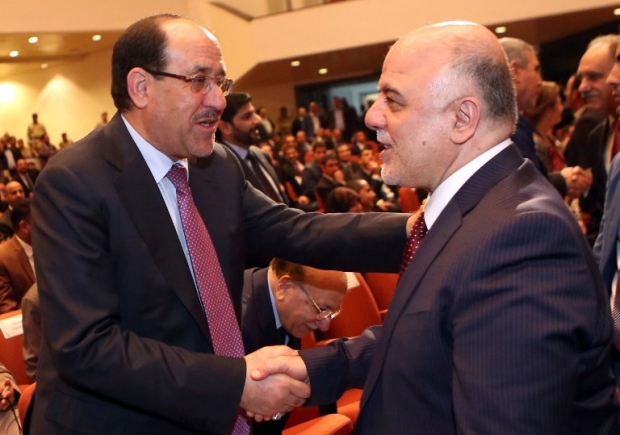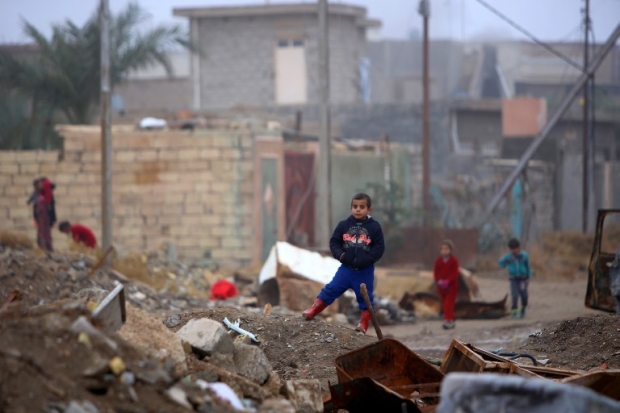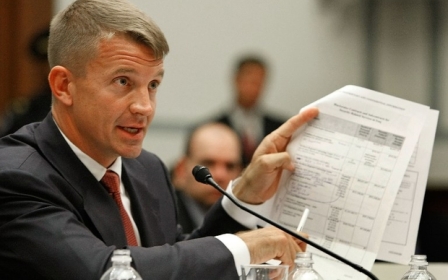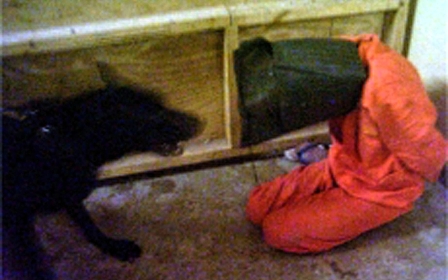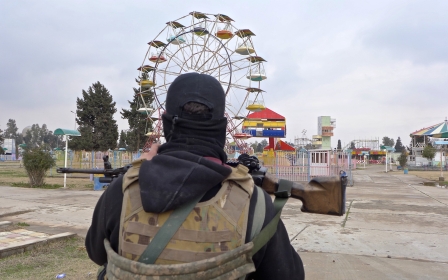The Sunni businessman trying to lead Iraq out of its quagmire
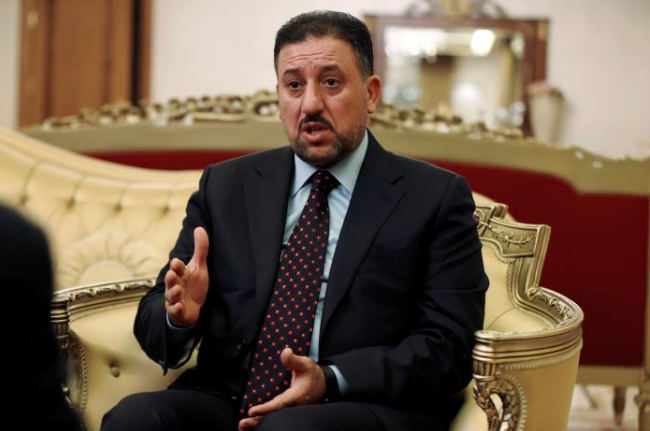
Sheikh Khamis al-Khanjar strides confidently into the Royal United Services Institute (RUSI) library in Whitehall on a cool London morning in early February.
He is a man who is comfortable in his own skin, someone who can size up an audience quickly. There are 20 of us in the library, a mix of academics, analysts, retired diplomats and two or three journalists.
We are here to listen to an Iraqi businessman with an intriguing back story. Khanjar is a native son of Fallujah, a city that is synonymous with violence. He is reportedly a billionaire, but the source of his money is something of a mystery.
In the 1990s, he is said to have worked with Saddam Hussain’s sons Uday and Qusay. When the dictator fell in 2003, he allegedly appropriated the loot from several businesses and headed to Dubai. It is a charge Khanjar has always denied.
What is undeniable is the role he has played as a Sunni advocate in a country ripped apart by sectarian discord.
READ: Muqtada al-Sadr: The unlikely answer to Iraq's sectarian problem
Critics say he helped to finance the anti-American insurgency in the immediate aftermath of the 2003 war, but then funded Sahwa, the Awakening movement, that together with the Americans routed al-Qaeda from Fallujah and broke its back in Anbar province.
He backed Iraqiya, a secular mainly Sunni political coalition headed by a Shia, Ayad Allawi. In the 2010 election, Iraqiya won the largest number of seats in a hopelessly fractured parliament. By law and the constitution, Iraqiya should have formed the government.
But it was prevented from doing so, largely because then US president Barack Obama took the calamitous decision to continue to support the Nouri al-Maliki prime ministership.
Maliki, a Shia sectarian, drove the country to near utter destruction until he was forced from office in 2014 when Obama belatedly realised his blunder.
By then, the Islamic State (IS) group was in control of Mosul and much of northern Iraq and was soon to acquire most of Anbar province, including the cities of Ramadi and Fallujah.
Leader of the Sunnis
Speaking in Arabic and without notes, looking from one to another of us, Khanjar begins with a question. How was IS created?
'Maliki jailed Sahwa fighters, they were chased by both al-Qaeda and the government, al-Qaeda issued an amnesty!'
- Khamis al-Khanjar
The answer, well-polished over several years of presenting it to various media outlets, is to argue that IS and its predecessor al-Qaeda in Iraq emerged because of the systematic marginalisation of the Sunnis.
It was a process that began, he said, with Paul Bremer’s “ill-advised decision to disband the army”. Bremer of course, was the famously inept head of the US-installed, post-war transitional authority.
When Nouri al-Maliki came to power in 2006, “he stepped up sectarian politics, targeted Sunni leaders in government, expelling and imprisoning them. Consequently, the Sunni community was leaderless” and into that vacuum stepped Abu Musab al-Zarqawi, the al-Qaeda in Iraq leader.
But the reward, according to Khanjar, was a poor one: “Maliki jailed Sahwa fighters, they were chased by both al-Qaeda and the government,” adding with a rueful shake of his head “al-Qaeda issued an amnesty!”
He told us that the American failure to support the Iraqiya coalition in 2010 reinforced the marginalisation of the Sunni and made the rebirth of al-Qaeda in the shape of IS inevitable.
And what of Haidar al-Abadi, Maliki’s successor as prime minister? “As Sunnis, we are trying to help Abadi. He is not sectarian, he is a moderate, but he is weak.” And he cites a recent decision that would have allowed a Sunni force to take charge of a now-liberated East Mosul:
“Abadi said this force would take control. It was a local force, it would not oppress the people and the people were hopeful. But Maliki attacked the decision in the media and Abadi changed his mind.”
A civil state, not a theocracy
Khanjar’s solution to Iraq’s seemingly intractable sectarian divide is to essentially acknowledge it as reality.
'From experience, Iraq benefits when relations are balanced with Turkey, the GCC and Iran'
-Khamis al-Khanjar
The country should split three ways in a loose federal arrangement that would allow the Sunni community to take charge of its own affairs, accept the quasi-independence of Iraqi Kurdistan and let the Shia sort out their relationship with Iran.
But beyond allowing provinces to vote in a referendum on the sort of deal each one wants, Khanjar is very short on the detail of how a federal state would work.
He has called for an end to prayers on television, that only the Iraqi flag be flown from government buildings and that Iraq “be declared a civil state and not a theocracy”. He says he doesn’t want to “be enemies with Iran. From experience, Iraq benefits when relations are balanced with Turkey, the GCC and Iran”.
READ: A not-so-historic deal: Iraq's post-IS vision runs into trouble
As for America, it may be that the Trump presidency with its clear tilt away from Tehran will benefit Khanjar’s vision. But for now, he is hedging his bets: “We agree with his statements that Iran has too much influence.”
Khanjar pauses then says: “It is not healthy to have external interference, Iraq does not benefit.” The added caveat was clearly intended for the Americans.
He is wise to be cautious of the man in the White House; after all, Trump has more than once threatened to take Iraq’s oil to pay for the 2003 war. All the more reason then for Khanjar to spend $65,000 a month with a lobbying firm run by former Clinton administration staffers to advance his cause in Washington.
A ray of light?
Khanjar is undoubtedly an astute politician. He has maintained his contacts with secular Shia and, for more than a decade, has patiently argued his corner. And to his credit, he has spent heavily in supporting refugees who fled to Kurdistan to escape IS.
His commitment to the Sunni cause, couched in moderate and secular language, as well as the call for a loose federation that preserves Iraq as a single entity, comes across as a sane voice in a sea of sectarian anarchy.
His friend fled to Fallujah on the assumption he would be safe only to have a finger cut off by militants when he was caught smoking. When Fallujah was liberated, he was held by the Americans for a month.
Accompanying the friend on Hajj, Khanjar said that while others around them prayed for the victory of the mujahideen and various other causes, his friend prayed, “Allah, make whoever is good victorious.”
It was an adroit way to end proceedings. A few handshakes and he was gone.
But left hanging in the sedate air of the library was the tantalising thought that with Khanjar there was, just possibly, a ray of light at the end of Iraq’s long and murderous tunnel.
- Bill Law is a Middle East analyst and a specialist in Gulf affairs. He tweets @billlaw49.
The views expressed in this article belong to the author and do not necessarily reflect the editorial policy of Middle East Eye.
Photo: Khamis al-Khanjar speaks during his interview with Reuters in Amman, Jordan on 26 November 2016 (Reuters)
Middle East Eye propose une couverture et une analyse indépendantes et incomparables du Moyen-Orient, de l’Afrique du Nord et d’autres régions du monde. Pour en savoir plus sur la reprise de ce contenu et les frais qui s’appliquent, veuillez remplir ce formulaire [en anglais]. Pour en savoir plus sur MEE, cliquez ici [en anglais].



